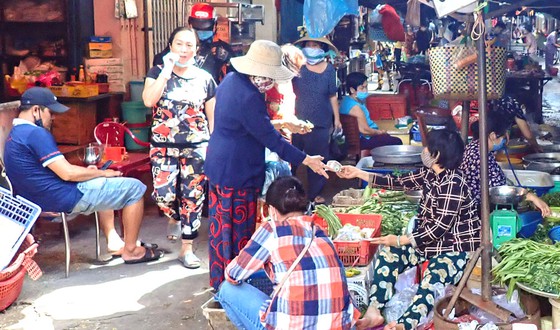 Society
Society

Many traditional markets in HCM City are paying more attention to COVID-19 prevention, but some small traders and local residents are not taking necessary precautions.

|
| Some people at Bàn Cờ Market in HCM City’s District 3 wear their face masks improperly. — Photo courtesy of www.sggp.org.vn |
HCM CITY — Many traditional markets in HCM City are paying more attention to COVID-19 prevention, but some small traders and local residents are not taking necessary precautions.
After detecting new COVID-19 cases at traditional markets in central Đà Nẵng City, the city as well as others in the country have strengthened disease control and prevention measures at traditional markets and temporary markets.
According to Sài Gòn Giải Phóng (Liberated Sài Gòn) newspaper, small-scale traders and people without face masks could be seen on August 24 at Bình Khánh Market in District 2 where hundreds of people come every day.
The same situation was seen in Đo Đạc Market in District 2, where sellers and buyers exchanged goods without wearing a mask.
Along Bùi Hữu Nghĩa Street, on the side of Bà Chiểu Market in Bình Thạnh District, many people in shops and restaurants as well as small traders and street vendors were not wearing a face mask. Many people were also not following the recommendations to keep a safe distance from each other.
At the Hòa Bình Market in District 5, only a few people were wearing masks amid crowds of sellers and buyers. Even some sellers were eating with their hands that were used to receive money from customers.
A man selling crabs in the market told Sài Gòn Giải Phóng newspaper that he has a face mask, but took it off because the weather was too hot.
“The market is very noisy, and people cannot hear me clearly if I wear a face mask,” he said.
Keeping a safe distance of at least two metres at Gò Vấp Market in Gò Vấp District was implemented at stalls selling dried foods and processed foods, but there were few people. However, customers stood close to each other in crowds around the stalls selling meat and vegetables.
Bình Tây Market in District 6, the city’s largest wholesale market and a tourist destination, has nearly 2,400 stalls with more than 5,600 traders and shop assistants. It welcomes about 6,000 people every day, including tourists.
Cao Văn Thành, deputy head of the market’s management board, said anyone failing to comply with anti-outbreak measures will be refused entry into the market.
“There is still a high risk of community transmission because a number of people outside the market only wear face masks when we remind them,” he said.
Preventive measures
The people’s committees of all districts in the city have supported the traditional markets’ management boards on disease prevention and control by removing all temporary markets, among other measures.
The city has hundreds of traditional markets and thousands of temporary markets.
The management board of Tân Định Market in District 1 has printed and distributed leaflets on disease prevention, and provided free dry hand-sanitiser gel and face masks for people entering the market.
A mobile team has been set up at Hóc Môn Wholesale Market in Hóc Môn District where more than 20,000 people work every night.
The team informs people about preventive measures, measures the temperature of traders, and regularly sprays disinfectant around the market stalls and vehicles carrying goods.
The market’s management board also offers free face masks and bottles of hand sanitiser for everyone.
District 8’s People’s Committee has assessed the risk of COVID-19 transmission at 16 traditional markets, Bình Điền Wholesale Market, and dozens of supermarkets and commercial centres.
Most units have ensured preventive measures, but the risk of infection in the community remains high.
Nguyễn Văn Hoàng, a member of the Bình Điền Wholesale Market’s management board, said traders and buyers are required to wear masks, wash their hands, and take their temperature before entering the market.
About 15,000-20,000 people visit the 20,000sq.m market daily.
“We set up a rapid response team to check and ask everyone to comply with the regulations, and strictly punish violators every night,” Hoàng said.
The city’s People’s Committee has asked district authorities and market management boards to strengthen epidemic prevention, and conduct random tests on people at risk of infection such as drivers and traders at markets, to prevent the spread of the coronavirus. — VNS